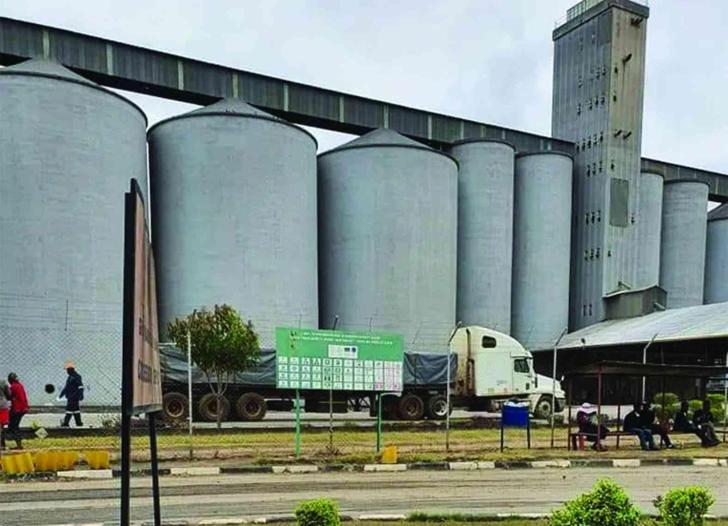News / Local
GMB shops help stabilise mealie meal prices
22 Dec 2024 at 10:34hrs |
0 Views

The establishment of 50 Grain Marketing Board (GMB) shops nationwide has successfully stabilised the prices of essential commodities such as mealie meal, sugar, and cooking oil, despite Zimbabwe grappling with its worst drought in over four decades.
These shops, which offer basic goods at affordable prices, have mitigated the usual spike in prices associated with drought years, ensuring access to critical food supplies for millions of Zimbabweans.
Speaking to The Sunday Mail, Lands, Agriculture, Fisheries, Water and Rural Development Minister Dr. Anxious Masuka said the Government's timely interventions had cushioned the nation from the full impact of El Niño.
"Mealie meal is available in shops. If you see mealie meal being sold beyond US$7.50 per 10 kilogrammes, please let us know so that we can intervene by sending appropriately priced mealie meal to those areas," said Dr. Masuka.
He added that roller meal at GMB shops is priced at US$5.30 per 10kg, significantly lower than prices elsewhere. By the first quarter of 2025, 38 additional GMB shops are expected to be operational, further increasing access to affordable goods.
The drought, initially projected to leave 6.2 million people in rural areas needing assistance, has resulted in an even greater need, with the Government now committed to feeding 9.2 million people until March 2025.
"There is enough grain in the strategic grain reserve to feed everyone until March next year," assured Dr. Masuka. "We will also feed 4.5 million learners in basic education schools until April, requiring 276,000 tonnes of grain for social welfare school-feeding programmes."
The GMB currently holds 253,000 tonnes of the required grain, with distribution for November already underway.
In addition to stabilising food prices, the Government has made significant strides in ensuring food security through the winter wheat season. Zimbabwe achieved a new record in wheat production, harvesting 563,961 tonnes, surpassing the previous year's 465,000 tonnes.
"Our target was to surpass 600,000 tonnes. Anything less than that is unacceptable in our efforts to achieve Vision 2030. What we strive for is having people with full stomachs and surplus food in our stocks."
To address maize shortages, the Government has partnered with the private sector, issuing import permits for 4.3 million tonnes of maize against a projected shortfall of one million tonnes.
"We have liberalised maize imports to create more opportunities and ensure sufficient supply," Dr. Masuka explained.
The GMB shops, along with Government-led initiatives and private sector partnerships, reflect a proactive approach to Zimbabwe's food security challenges. These efforts aim to ensure that even in the face of severe drought, affordable food remains accessible, and the nation progresses toward its Vision 2030 goals.
These shops, which offer basic goods at affordable prices, have mitigated the usual spike in prices associated with drought years, ensuring access to critical food supplies for millions of Zimbabweans.
Speaking to The Sunday Mail, Lands, Agriculture, Fisheries, Water and Rural Development Minister Dr. Anxious Masuka said the Government's timely interventions had cushioned the nation from the full impact of El Niño.
"Mealie meal is available in shops. If you see mealie meal being sold beyond US$7.50 per 10 kilogrammes, please let us know so that we can intervene by sending appropriately priced mealie meal to those areas," said Dr. Masuka.
He added that roller meal at GMB shops is priced at US$5.30 per 10kg, significantly lower than prices elsewhere. By the first quarter of 2025, 38 additional GMB shops are expected to be operational, further increasing access to affordable goods.
The drought, initially projected to leave 6.2 million people in rural areas needing assistance, has resulted in an even greater need, with the Government now committed to feeding 9.2 million people until March 2025.
The GMB currently holds 253,000 tonnes of the required grain, with distribution for November already underway.
In addition to stabilising food prices, the Government has made significant strides in ensuring food security through the winter wheat season. Zimbabwe achieved a new record in wheat production, harvesting 563,961 tonnes, surpassing the previous year's 465,000 tonnes.
"Our target was to surpass 600,000 tonnes. Anything less than that is unacceptable in our efforts to achieve Vision 2030. What we strive for is having people with full stomachs and surplus food in our stocks."
To address maize shortages, the Government has partnered with the private sector, issuing import permits for 4.3 million tonnes of maize against a projected shortfall of one million tonnes.
"We have liberalised maize imports to create more opportunities and ensure sufficient supply," Dr. Masuka explained.
The GMB shops, along with Government-led initiatives and private sector partnerships, reflect a proactive approach to Zimbabwe's food security challenges. These efforts aim to ensure that even in the face of severe drought, affordable food remains accessible, and the nation progresses toward its Vision 2030 goals.
Source - the sunday mail
Join the discussion
Loading comments…































